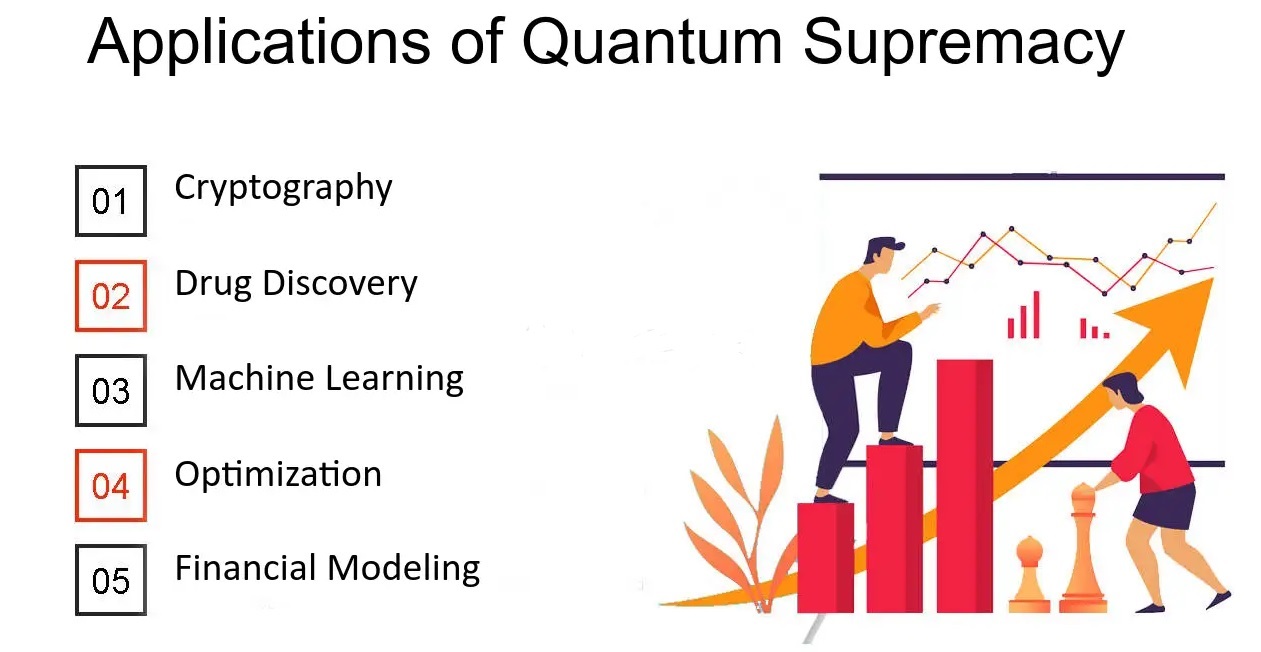Quantum Supremacy: Unraveling the Power of Quantum Computing

Quantum supremacy represents a watershed
moment in the realm of computing, heralding the dawn of a new era where quantum
systems outperform classical computers in solving certain tasks. This paradigm
shift, enabled by the principles of quantum mechanics, holds transformative
implications across diverse fields, from cryptography and optimization to drug
discovery and materials science. In this expansive article, we embark on a
journey through the intricacies of quantum supremacy, exploring the underlying
principles, recent breakthroughs, applications, challenges, and the future
trajectory of quantum computing.

Understanding
Quantum Supremacy
Quantum supremacy refers to the capability of quantum computers to solve computational problems that are intractable for classical computers within a reasonable timeframe. At the heart of quantum supremacy lies the fundamental principle of superposition, wherein quantum bits or qubits can exist in multiple states simultaneously, and entanglement, wherein qubits become correlated with one another, enabling exponential computational power.
Superposition: Unlike classical bits, which can exist in a state of 0 or 1, qubits can exist in a superposition of both states simultaneously. This inherent parallelism allows quantum computers to explore multiple solutions to a problem simultaneously, vastly accelerating computation for certain tasks.
Entanglement: Entanglement is a phenomenon wherein the state of one qubit becomes correlated with the state of another qubit, irrespective of the distance between them. This non-local correlation enables quantum computers to perform complex computations by harnessing the collective behavior of entangled qubits.
Quantum Gates: Quantum gates are the basic building blocks of quantum circuits, analogous to classical logic gates. Quantum gates manipulate the state of qubits, performing operations such as superposition, entanglement, and measurement, thereby enabling quantum algorithms to execute computational tasks.
Demonstrations
of Quantum Supremacy
Several landmark experiments have demonstrated quantum supremacy by showcasing the superiority of quantum computers over classical computers in performing specific tasks:
Google's Quantum Supremacy Experiment: In October 2019, Google's research team, led by John Martinis, announced the achievement of quantum supremacy using their 53-qubit quantum processor named Sycamore. The experiment involved solving a specialized problem known as random circuit sampling, demonstrating that the quantum computer could perform the task in minutes, whereas the most powerful classical supercomputers would require thousands of years to achieve the same feat.
IBM's Quantum Volume Metric: IBM has developed a metric known as quantum volume to assess the performance of quantum computers. Quantum volume takes into account factors such as the number of qubits, gate error rates, and connectivity between qubits. IBM's efforts in enhancing the quantum volume of its quantum processors signify progress towards achieving quantum supremacy and scaling up quantum computing capabilities.
Other Quantum Computing Platforms: Besides Google and IBM, other companies and research institutions are also making strides in the quest for quantum supremacy. Companies like Rigetti Computing, IonQ, and D-Wave Systems are developing diverse approaches to quantum computing, including superconducting qubits, ion trap qubits, and adiabatic quantum annealing, each with its unique advantages and challenges.

Applications
of Quantum Supremacy
The advent of quantum supremacy has
profound implications across various domains, unlocking new possibilities and
capabilities in:
Cryptography and Cybersecurity: Quantum computers have the potential to revolutionize cryptography by rendering traditional encryption schemes, such as RSA and ECC, vulnerable to quantum attacks. Quantum-resistant cryptographic algorithms, based on mathematical principles immune to quantum attacks, are being developed to safeguard sensitive information in the era of quantum computing.
Optimization and Machine Learning: Quantum computers excel at solving optimization problems, such as portfolio optimization, logistics planning, and protein folding, which are computationally intensive for classical computers. Quantum machine learning algorithms leverage quantum principles to accelerate tasks such as data clustering, pattern recognition, and feature selection, offering enhanced capabilities for data-driven decision-making.
Drug Discovery and Materials Science: Quantum computers enable precise simulations of molecular structures and chemical reactions, facilitating drug discovery, materials design, and catalyst optimization. Quantum simulations can elucidate the behavior of complex biomolecules, predict drug interactions, and accelerate the development of novel therapeutics for treating diseases.
Financial Modeling and Risk Analysis: Quantum computing offers advantages in financial modeling and risk analysis by enabling the efficient evaluation of complex financial instruments, portfolio optimization strategies, and risk management techniques. Quantum algorithms can optimize trading strategies, simulate market dynamics, and mitigate systemic risks in financial markets.
Climate
Modeling and Renewable Energy: Quantum computers
have the potential to revolutionize climate modeling and renewable energy
research by simulating complex environmental systems, predicting climate
patterns, and optimizing energy storage technologies. Quantum simulations can
accelerate the discovery of novel materials for solar cells, batteries, and
carbon capture technologies, thereby advancing sustainability and mitigating
climate change.
Challenges
and Future Directions
Despite the remarkable progress in quantum computing, several challenges and opportunities lie ahead on the path towards realizing the full potential of quantum supremacy:
Qubit Quality and Error Correction: Improving qubit coherence times, gate fidelities, and error correction capabilities is essential for scaling up quantum computers and achieving quantum supremacy with larger, more complex systems. Error mitigation techniques, fault-tolerant quantum error correction codes, and quantum annealing approaches are being pursued to address these challenges.
Hardware Scalability and Connectivity: Scaling up the number of qubits and enhancing qubit connectivity are essential for tackling real-world problems with quantum computers. Developing scalable quantum architectures, optimizing qubit connectivity graphs, and implementing fault-tolerant error correction schemes are critical for realizing large-scale quantum computing systems.
Algorithm Development and Quantum Software: Developing efficient quantum algorithms tailored to specific applications is paramount for harnessing the power of quantum computers. Quantum algorithm design, quantum software development frameworks, and hybrid classical-quantum algorithms are areas of active research aimed at maximizing the utility of quantum computing across diverse domains.
Interdisciplinary Collaboration and Education: Fostering interdisciplinary collaboration between quantum physicists, computer scientists, mathematicians, and domain experts is essential for advancing quantum computing research and applications. Educational initiatives, quantum computing training programs, and public outreach efforts can cultivate a skilled workforce and raise awareness about the potential of quantum technologies.
Ethical
and Societal Implications: Anticipating and
addressing the ethical, societal, and policy implications of quantum computing
is essential for ensuring responsible development and deployment of quantum
technologies. Ethical frameworks, privacy-preserving algorithms, and regulatory
guidelines can safeguard against potential risks and promote equitable access
to the benefits of quantum computing.
Editor’s
Thoughts:
Quantum supremacy represents a
transformative milestone in the evolution of computing, showcasing the
unparalleled capabilities of quantum systems in solving complex problems beyond
the reach of classical computers. From cryptography and optimization to drug
discovery and climate modeling, quantum computing promises to revolutionize
diverse fields and unlock new frontiers of exploration and discovery. While
challenges remain on the path towards realizing the full potential of quantum
supremacy, the remarkable progress and ongoing research efforts underscore the
profound impact of quantum computing on society, science, and technology in the
decades to come.


